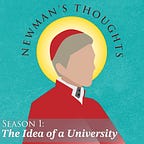Reading for Day 7: The Idea of a University, Discourse I, Introductory, § 1
Complete Recording of Discourse I @ Catholic Culture Audiobooks
Paperback with Introduction by Dr. Don Briel available @ Cluny Media
Full online text of The Idea of a University and other works by St. John Henry Newman are available @ the National Institute for Newman Studies’ Newman Reader
Discourse I.
Introductory
1.
In addressing myself, Gentlemen, to the consideration of a question which has excited so much interest, and elicited so much discussion at the present day, as that of University Education, I feel some explanation is due from me for supposing, after such high ability and wide experience have been brought to bear upon it, that any field remains for the additional labours either of a disputant or of an inquirer. If, nevertheless, I still venture to ask permission to continue the discussion, already so protracted, it is because the subject of Liberal Education, and of the principles on which it must be conducted, has ever had a hold upon my own mind; and because I have lived the greater part of my life in a place which has all that time been occupied in a series of controversies both domestic and with strangers, and of measures, experimental or definitive, bearing upon it. About fifty years since, the English University, of which I was so long a member, after a century of inactivity, at length was roused, at a time when (as I may say) it was giving no education at all to the youth committed to its keeping, to a sense of the responsibilities which its profession and its station involved, and it presents to us the singular example of an heterogeneous and an independent body of men, setting about a work of self-reformation, not from any pressure of public opinion, but because it was fitting and right to undertake it. Its initial efforts, begun and carried on amid many obstacles, were met from without, as often happens in such cases, by ungenerous and jealous criticisms, which, at the very moment that they were urged, were beginning to be unjust. Controversy did but bring out more clearly to its own apprehension the views on which its reformation was proceeding, and throw them into a philosophical form. The course of beneficial change made progress, and what was at first but the result of individual energy and an act of the academical corporation, gradually became popular, and was taken up and carried out by the separate collegiate bodies, of which the University is composed. This was the first stage of the controversy. Years passed away, and then political adversaries arose against it, and the system of education which it had established was a second time assailed; but still, since that contest was conducted for the most part through the medium, not of political acts, but of treatises and pamphlets, it happened as before that the threatened dangers, in the course of their repulse, did but afford fuller development and more exact delineation to the principles of which the University was the representative.
In the former of these two controversies the charge brought against its studies was their remoteness from the occupations and duties of life, to which they are the formal introduction, or, in other words, their inutility; in the latter, it was their connexion with a particular form of belief, or, in other words, their religious exclusiveness.
Living then so long as a witness, though hardly as an actor, in these scenes of intellectual conflict, I am able to bear witness to views of University Education, without authority indeed in themselves, but not without value to a Catholic, and less familiar to him, as I conceive, than they deserve to be. And, while an argument originating in the controversies to which I have referred, may be serviceable at this season to that great cause in which we are here so especially interested, to me personally it will afford satisfaction of a peculiar kind; for, though it has been my lot for many years to take a prominent, sometimes a presumptuous, part in theological discussions, yet the natural turn of my mind carries me off to trains of thought like those which I am now about to open, which, important though they be for Catholic objects, and admitting of a Catholic treatment, are sheltered from the extreme delicacy and peril which attach to disputations directly bearing on the subject-matter of Divine Revelation.




